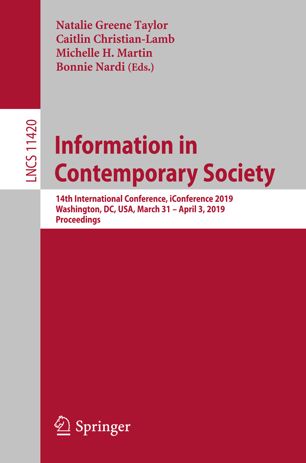

Most ebook files are in PDF format, so you can easily read them using various software such as Foxit Reader or directly on the Google Chrome browser.
Some ebook files are released by publishers in other formats such as .awz, .mobi, .epub, .fb2, etc. You may need to install specific software to read these formats on mobile/PC, such as Calibre.
Please read the tutorial at this link: https://ebookbell.com/faq
We offer FREE conversion to the popular formats you request; however, this may take some time. Therefore, right after payment, please email us, and we will try to provide the service as quickly as possible.
For some exceptional file formats or broken links (if any), please refrain from opening any disputes. Instead, email us first, and we will try to assist within a maximum of 6 hours.
EbookBell Team

0.0
0 reviewsThis book constitutes the proceedings of the 14th International Conference on Information in Contemporary Society, iConference 2019, held in Washington, DC, USA, in March/April 2019.
The 44 full papers and 33 short papers presented in this volume were carefully reviewed and selected from 133 submitted full papers and 88 submitted short papers. The papers are organized in the following topical sections: Scientific work and data practices; methodological concerns in (big) data research; concerns about “smart” interactions and privacy; identity questions in online communities; measuring and tracking scientific literature; limits and affordances of automation; collecting data about vulnerable populations; supporting communities through public libraries and infrastructure; information behaviors in academic environments; data-driven storytelling and modeling; online activism; digital libraries, curation and preservation; social-media text mining and sentiment analysis; data and information in the public sphere; engaging with multi-media content; understanding online behaviors and experiences; algorithms at work; innovation and professionalization in technology communities; information behaviors on Twitter; data mining and NLP; informing technology design through offline experiences; digital tools for health management; environmental and visual literacy; and addressing social problems in iSchool research.